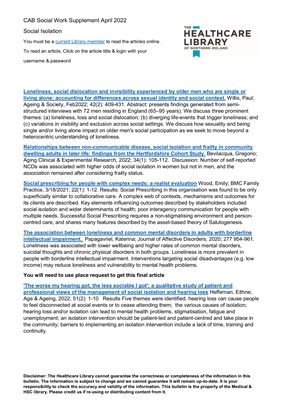
CAB Social Work Supplement April 2022
Social Isolation
You must be a current Library member to read the articles online.
To read an article, Click on the article title & login with your
username & password
Disclaimer: The Healthcare Library cannot guarantee the correctness or completeness of the information in this
bulletin. The information is subject to change and we cannot guarantee it will remain up-to-date. It is your
responsibility to check the accuracy and validity of the information. This bulletin is the property of the Medical &
HSC library. Please credit us if re-using or distributing content from it.
Loneliness, social dislocation and invisibility experienced by older men who are single or
living alone: accounting for differences across sexual identity and social context. Willis, Paul;
Ageing & Society, Feb2022; 42(2): 409-431. Abstract: presents findings generated from semistructured
interviews with 72 men residing in England (65-95 years). We discuss three prominent
themes: (a) loneliness, loss and social dislocation; (b) diverging life-events that trigger loneliness; and
(c) variations in visibility and exclusion across social settings. We discuss how sexuality and being
single and/or living alone impact on older men's social participation as we seek to move beyond a
heterocentric understanding of loneliness.
Relationships between non-communicable disease, social isolation and frailty in community
dwelling adults in later life: findings from the Hertfordshire Cohort Study. Bevilacqua, Gregorio;
Aging Clinical & Experimental Research, 2022; 34(1): 105-112. Discussion: Number of self-reported
NCDs was associated with higher odds of social isolation in women but not in men, and the
association remained after considering frailty status.
Social prescribing for people with complex needs: a realist evaluation Wood, Emily; BMC Family
Practice, 3/18/2021; 22(1): 1-12. Results: Social Prescribing in this organisation was found to be only
superficially similar to collaborative care. A complex web of contexts, mechanisms and outcomes for
its clients are described. Key elements influencing outcomes described by stakeholders included
social isolation and wider determinants of health; poor interagency communication for people with
multiple needs. Successful Social Prescribing requires a non-stigmatising environment and personcentred
care, and shares many features described by the asset-based theory of Salutogenesis.
The association between loneliness and common mental disorders in adults with borderline
intellectual impairment. Papagavriel, Katerina; Journal of Affective Disorders, 2020; 277 954-961.
Loneliness was associated with lower wellbeing and higher rates of common mental disorders,
suicidal thoughts and chronic physical disorders in both groups. Loneliness is more prevalent in
people with borderline intellectual impairment. Interventions targeting social disadvantages (e.g. low
income) may reduce loneliness and vulnerability to mental health problems.
You will need to use place request to get this final article
'The worse my hearing got, the less sociable I got': a qualitative study of patient and
professional views of the management of social isolation and hearing loss Heffernan, Eithne;
Age & Ageing, 2022; 51(2): 1-10 Results Five themes were identified. hearing loss can cause people
to feel disconnected at social events or to cease attending them; the various causes of isolation;
hearing loss and/or isolation can lead to mental health problems, stigmatisation, fatigue and
unemployment; an isolation intervention should be patient-led and patient-centred and take place in
the community; barriers to implementing an isolation intervention include a lack of time, training and
continuity.